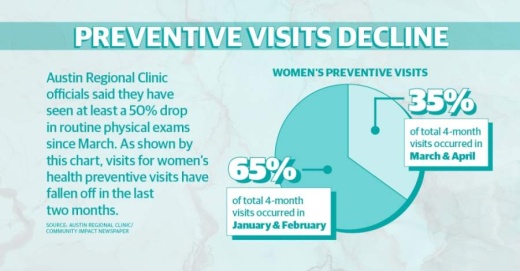While local hospitals work to save the lives of coronavirus patients, other health care professionals are concerned about the long-term health effects that some patients will face long after the pandemic due to a decline in preventive health screenings.
“If we look at what has happened across the board, we’ve seen probably a 50%-60% drop for people coming in for routine physical exams ... which results in a decrease of preventive services across the board—breast cancer, colorectal screening, diabetes screening,” said Dr. Jay Zdunek, the chief medical officer for Austin Regional Clinic.
Other health care providers in the Austin area have reported similar trends. Even after Gov. Greg Abbott lifted the state’s prohibition of elective surgeries and health care services, patients are slow to march back into doctors offices, even when facing serious heart conditions or pain management.
The long-lasting effect of the coronavirus on the patient population, local health care leaders said, may be felt years down the road as irreparable damage takes its toll.
“Though COVID-19 is scary ... cardiovascular disease can certainly do dramatic and incredible damage, and it hasn’t gone away,” said Dr. Peter Monteleone, an interventional cardiologist at Ascension Medical Group.
Preventative health visits in decline
Abbott on March 22 directed hospitals to cancel elective procedures as a means to secure resources for coronavirus patients. One month later, the governor partially lifted the prohibition on elective procedures and surgeries, effectively allowing clinics, general practice offices and other medical specialties to reopen to patients. Per the governor’s orders, hospitals are still required to reserve at least 25% of their capacity for COVID-19 patients.
At ARC, the decline in office visits is resulting in a declining number of patients receiving preventive health care visits.
“The impact of COVID-19 on preventive services is significant,” Zdunek said. “We cannot forget that preventive health care is still the best and cheapest form of reducing overall complications from disease processes that we can do.”
As patients miss routine physical exams, the number of screenings continues to drop, Zdunek said. Since the beginning of the pandemic, ARC reported it has conducted a shrinking number of women’s preventive health visits, colorectal cancer screenings and diabetes screenings.
“There are so many domino effects from this that we can’t really predict how it impacts any one individual. We have concerns there will be people that fall through the cracks,” Zdunek said.
According to data provided by ARC, 65% of all women’s preventive health visits over the past four months occurred in January and February. Heidi Shalev, ARC vice president of market, communications and engagement, said "“typically in the same 4-month period, the pie graph would show our doctors provided 50% of the preventive visits in January and February and 50% in March and April.”
Zdunek said ARC has been able to fill many of the gaps in screenings by utilizing telemedicine visits. Regardless, many patients are still reluctant to come into ARC’s offices for routine blood tests and eye exams, Zdunek said. Results of those tests can be early indicators for diabetes complications.
“The reality is, I think the population in general is a little bit leery of going to the doctor ... because they still don’t know what this virus means if they contract it,” Zdunek said. “We want people to know they need to trust their physicians when it is time to start doing things again.”
Preparing for surgery
A research paper published April 9 in the Journal of the American College of Cardiology found nine high-volume cath labs across the U.S. averaged a 35% decrease in monthly visits due to ST-Elevation Myocardial Infarction, or STEMI, a serious type of heart attack, in March.
In Austin, Monteleone said Ascension hospitals in April experienced a 40% decline in STEMI treatment compared to April 2019.
But Monteleone said he does not believe fewer Austin residents are suffering from heart attacks and other cardiovascular afflictions during stay-in-place orders. Rather, the cardiologist suspects patients are electing to stay away from hospitals and emergency rooms while experiencing heart attacks.
“There is nothing about this virus that should be preventing heart attacks. If anything viral infections increase heart attacks,” Monteleone said. “The danger is that people are getting the classic symptoms and are so concerned about being in a hospital environment that they ride out the symptoms. ... Once the muscle is dead, it's not coming back.”
Patients who suffered heart attacks and did not come in for immediate care face a number of “downstream problems” that include congestive heart failure, arrhythmia, cardiac arrest and further heart muscle issues, Monteleone said.
“The terrible part of this is if they come to the hospital [it is a] minimally invasive procedure that often takes 30 minutes to do,” Monteleone said. “It is not uncommon for people to ask to go home right after the procedure.” Following Abbott’s March 22 prohibition of elective surgeries, all procedures at Texas Orthopedics Austin stopped. Dr. Randall Schultz, an orthopedic surgeon at Texas Orthopedics Austin, said he ceased operations even before that. It has been nine weeks since Schultz has performed a surgery, he said, and he estimates between 80-100 hip and knee replacements have been put off.
Schultz told Community Impact Newspaper that he is continuing to postpone elective replacement surgeries despite the green light from the governor’s office.
“I have concerns about the majority of my patient group; they're a vulnerable population,” Schultz said. “I’m hopeful I’ll get started late May, early June. ... I haven’t pulled the trigger quite yet. We’ll probably do [surgery on] our younger, healthier group first.”
While operations have stopped for hip and knee replacement patients, Schultz said they may be dealing with long periods of pain. There is additional concern for patients who are so immobile that they may develop other health conditions that increase risk of complications during surgery, Schultz said.
The closure of health care facilities has also forced patients receiving physical therapy following surgeries to continue treatment without in-person aid from medical professionals.
“It is a big concern of mine. Knee replacements typically require extensively more therapy,” Schultz said. “It is harder to get a true handle on it, but I think we’re going to see more problems with stiffness.”
In contrast to the orthopedic surgeon’s conservative timelines to get patients back into the operating room, Monteleone stressed heart health patients do not have the ability to wait.
“Folks might just be dying at home and classified as a cardiac death,” Monteleone said. “We’ve seen multiple patients who have presented too late. ... We’re just at the tip of the iceberg right now. Hopefully we can prevent [ourselves] from having to see the whole iceberg.”
If patients experiencing STEMIs and other serious heart afflictions do not make it to the hospital in time, heart muscles can permanently die, Monteleone said, and may require open heart surgery.
Ascension is currently engaged in outreach to patients who have known cardiovascular complications, and Monteleone said the hospital system has been preparing for safe elective surgeries throughout the entirety of the governor’s mandated shutdowns. Extra cath labs have been opened to handle procedures over the next several months, and Ascension is testing any patients who come into the cath lab environment.
Due to the vulnerable nature of cardiovascular patients, Monteleone said Ascension’s team is taking every extra precaution to ensure safe environments and mitigate the risk of contracting and spreading the coronavirus.
“The hospitals have built in a really rigorous protocol. Going to the hospital now is nothing like going to the hospital a few months ago,” Monteleone said.





